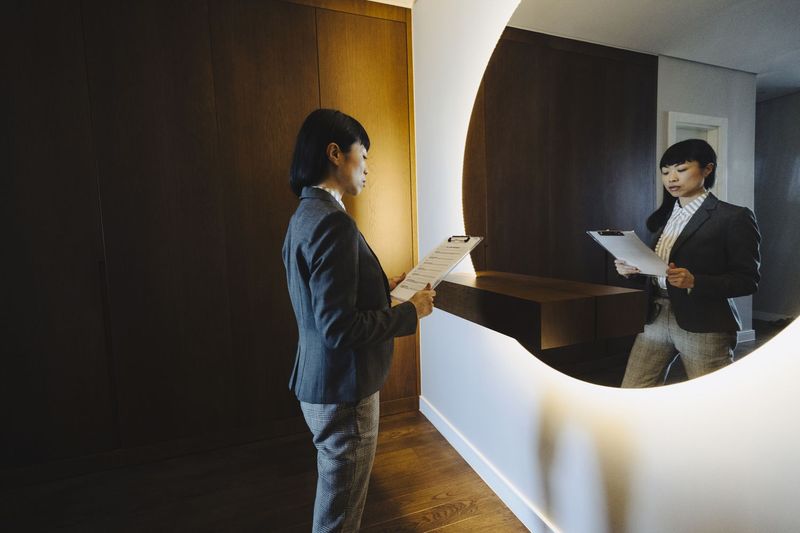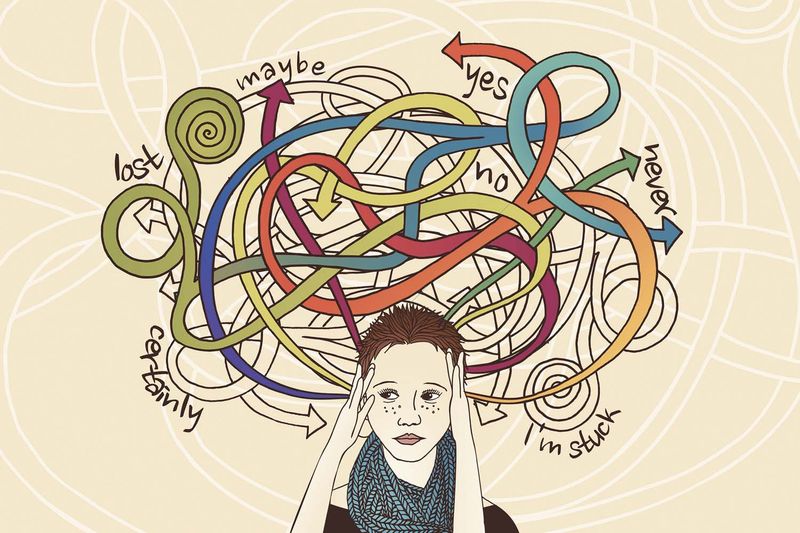17 Things That Seem Weird — But Are Totally Normal For Someone With Social Anxiety
Social anxiety can manifest in many ways that may appear unusual to those who don’t experience it. These behaviors are often coping mechanisms that help individuals navigate social interactions.
Understanding these quirks can foster empathy and dismantle misunderstandings. Here’s a look at 17 things that are completely normal for someone dealing with social anxiety.
1. Rehearsing Conversations

Rehearsing conversations before they actually happen might seem odd to some, but it’s a common practice for those with social anxiety. It provides a sense of control and prepares them for potential outcomes.
Visualizing different scenarios can ease the fear of the unknown, making social interactions more manageable. Those few extra minutes in front of a mirror can mean the difference between feeling panicked and feeling prepared.
For many, it’s a vital ritual that helps calm nerves. This habit isn’t just about scripting words; it’s about building confidence. By imagining various responses, they equip themselves for a range of reactions. It’s a personal pep talk that offers reassurance in a world that often feels intimidating.
2. Overthinking Text Greetings

Crafting the perfect text greeting can feel like a monumental task. For someone with social anxiety, the pressure of choosing the right word or emoji can be intense. Overthinking how to say “hi” might sound trivial, but it reflects a deeper desire to avoid misunderstandings.
The fear of being misinterpreted or coming across as awkward looms large. Every character counts, and so does the timing of delivery. This internal debate, though invisible to others, is a vivid experience. It’s about ensuring the message conveys the right tone.
These seemingly small choices are weighed carefully, showcasing how much thought and care are invested in each interaction.
3. Taking a Full Day to Recharge

Needing a full 24 hours to recover from a short event might seem excessive, but it’s quite normal for those with social anxiety. Social interactions can be draining, requiring substantial emotional energy. Afterward, a retreat to solitude allows for mental recovery.
This quiet time helps process the array of emotions experienced during the event. It’s not laziness; it’s necessary self-care. The body and mind need time to recalibrate. This pause is about honoring personal limits and rejuvenating energy stores.
Finding tranquility in solitude, they gradually restore their sense of balance, ready to face the world again when they’re truly ready.
4. Feeling Exhausted by Small Talk

Engaging in small talk can feel like running a marathon for someone with social anxiety. The seemingly simple act of chatting about the weather or weekend plans can be mentally exhausting.
Every word is carefully chosen, and every response meticulously evaluated. It’s not just about exchanging pleasantries; it’s about navigating a landscape filled with potential social pitfalls. The effort to appear relaxed and engaged takes a toll.
This exhaustion is not a lack of interest but a reflection of the energy required to maintain social interactions. Understanding this can help in offering patience and support to those who find small talk challenging.
5. Canceling Plans Despite Excitement

Canceling plans they were excited about can puzzle others, but it’s a familiar scenario for those with social anxiety. The anticipation of social events can morph into overwhelming dread. This anxiety often battles with genuine excitement, leaving a conflicted feeling.
It’s not that they don’t want to attend; it’s just that the anxiety often wins. Canceling becomes a way to alleviate the stress of potential social scrutiny. The relief that follows is immediate, yet tinged with guilt for missing out.
This action is a protective measure, prioritizing mental health over social obligations. It’s about finding peace in the choice to prioritize self-care.
6. Fearing to Burden Others

Worrying about being a burden just for reaching out is a common concern. The idea of imposing on someone’s time or emotions can be paralyzing. This fear stems from a deep-seated need to be considerate, often at the expense of their own needs.
It’s a balancing act between wanting to connect and fearing that their presence might be unwelcome. This hesitation can lead to isolation, even when reaching out could provide relief.
Understanding this fear can foster more compassionate communication, encouraging open dialogues that reassure them of their valued presence. It’s about learning to trust that their voice deserves to be heard.
7. Obsessing Over Past Words

Obsessing over something said three years ago may seem excessive, but it’s a reality for many with social anxiety. Words spoken in the past can echo loudly in their minds, analyzed repeatedly to uncover possible mistakes.
This constant replaying is not about dwelling in the past; it’s about learning from perceived errors. Each word is scrutinized for its impact, real or imagined. This process, though draining, is driven by a desire for self-improvement.
Recognizing this pattern can help in offering reassurance and perspective, reminding them that everyone makes mistakes and that these moments often matter less than they imagine.
8. Leaving Parties Early

Needing to leave a party early to feel sane again might be misinterpreted as rudeness, but it’s a crucial coping mechanism. The sensory overload of social gatherings can be overwhelming.
Stepping away offers a much-needed respite from the noise and energy. This exit is not about avoiding fun but about maintaining mental well-being. It allows for a moment of calm, a chance to regroup and breathe.
Those who understand this need can offer support by acknowledging their bravery in attending and respecting their decision to leave when necessary. It’s a small act of self-preservation that makes larger social interactions possible.
9. Preferring Texts Over Calls

Avoiding calls but loving texts might seem contradictory, yet it’s a common preference. Texts offer control over the pace and timing of communication, reducing the pressure of immediate responses.
This preference allows for thoughtful exchanges without the anxiety of spontaneous conversation. Calls, in contrast, can feel intrusive and overwhelming.
Understanding this choice can enhance communication, showing that the medium is less important than the message. It’s about finding ways to connect that honor their comfort levels.
10. Excessive Smiling from Panic

Smiling too much out of pure panic can be misinterpreted as friendliness. For those with social anxiety, it’s a defense mechanism to mask nerves.
This constant smile acts as a shield against judgment, projecting confidence they may not feel. It’s a way to navigate social spaces, hoping to blend in and deflect attention.
Recognizing this behavior can lead to more empathetic interactions, understanding that beneath the smile might lie a struggle for composure.
11. Feeling Constantly Observed

Feeling like everyone’s watching—even when no one is—captures the essence of social anxiety. This heightened self-awareness can be paralyzing, making simple tasks feel daunting.
The sensation of being under a spotlight creates constant pressure to appear perfect. Each action is scrutinized internally, amplifying insecurities.
Offering understanding can alleviate this burden, reminding them that most people are too focused on themselves to notice others’ perceived flaws. It’s about shifting focus from imaginary critics to self-acceptance.
12. Replaying Interactions

Replaying every interaction for signs they messed up is a nightly ritual for some. This mental loop is fueled by anxiety, searching for mistakes or awkward moments.
The spotlight of their mind revisits each detail, questioning if they offended or appeared foolish. This rumination feeds insecurities but is also a way to prepare for future encounters.
Understanding this pattern can lead to gentle reassurance, reminding them that everyone has moments of doubt but few are as significant as they seem in retrospect.
13. Needing a Companion for Outings

Needing to bring someone just to go somewhere is a familiar comfort. A companion provides support, someone to lean on when anxiety peaks.
This presence offers reassurance, transforming daunting environments into manageable ones. It’s not about dependence; it’s about creating a safety net.
Understanding this need can lead to more supportive friendships, acknowledging the courage it takes to face social situations with a trusted ally nearby.
14. Bathroom Breaks for Resets

Hiding in the bathroom for a quick reset is a tactic to regain composure. For someone with social anxiety, stepping away offers a moment to breathe and collect thoughts.
This brief escape is not avoidance but a strategic pause. It allows them to return to the social setting with renewed energy.
Appreciating this need for solitude can foster understanding, recognizing the courage it takes to rejoin the group after a momentary retreat.
15. Practicing Food Orders

Practicing how to order food is a small but significant ritual. For someone with social anxiety, even mundane tasks can feel daunting.
Rehearsing the order ensures they can speak clearly without stumbling, reducing the risk of misunderstanding. It’s a way to take control of the situation.
Recognizing the effort behind this preparation can lead to more patient interactions, understanding that what seems simple to one may be a challenge to another.
16. Feeling “Rude” for Assertiveness

Feeling “rude” for asserting basic needs is a common struggle. The desire to avoid conflict often leads to self-silencing.
This behavior stems from a deep-seated need to maintain harmony, sometimes at the expense of personal comfort. Speaking up can feel like risking rejection or disapproval.
Recognizing this internal conflict can lead to more supportive environments, encouraging them to express themselves without fear of judgment.
17. Overanalyzing Neutral Cues

Reading too much into neutral tones or looks is a hallmark of social anxiety. Each glance or tone of voice is analyzed for hidden meaning.
This hyper-awareness can create misunderstandings, projecting insecurities onto innocent expressions. It’s about seeking validation and avoiding missteps.
Recognizing this tendency can foster empathy, reminding them that not every look carries a hidden message. It’s about finding peace in accepting things at face value.







